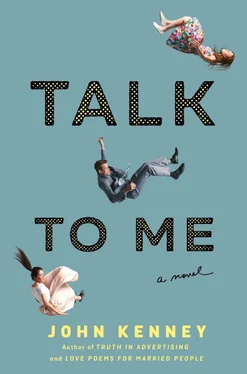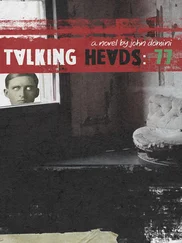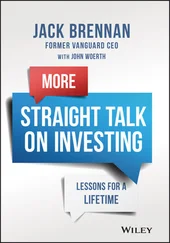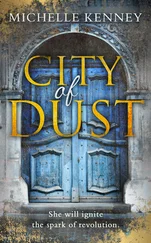And here the energy seemed to leave Murray completely. He exhaled and sat down.
“I’m sorry I raised my voice,” he said, staring at his keyboard.
Grace and Jagdish looked at Murray, waiting.
Jagdish said, “Murray.”
“What?” Murray stared at his desk.
“Would you like some soup?”
He looked at them. “Are you coming back?”
Jagdish looked at Grace. She didn’t answer right away.
“How about a mulligatawny?” she said to the floor.
“Okay,” Murray said. “And some oyster crackers, please.”
He began typing.
• • •
Ted woke early, after another night of not sleeping well, and had, around dawn, fallen into a deep and wonderful sleep for about an hour. He lay in bed for a time, unable to find the energy to get up, the regret and shame taking a foothold the moment he opened his eyes. He considered going to the gym in the building and riding the stationary bike for forty-five minutes and then doing light weights, rolling his fascia on the foam roller, then taking a relaxing steam, all of the things a high-priced personal trainer he had hired a year ago—two years ago?—had urged him to do but which he almost never did.
Ted had shaved and showered but had yet to dress. What he was able to achieve was making a pot of coffee, though the basic movements took time and he was aware of all of them. Now he stood at the window and looked out over the park.
He thought life would wait for him. While he was in the bubble, in the anchor chair, the most trusted name in network news. He thought life would wait and that there would be time to fix everything. Claire and Franny. He thought there would be time. But people had failed to wait for him. They had gone on living.
Paris. He thought maybe he and Claire would go back to Paris. They’d been, before Franny was born. They had stayed at a small hotel in the Sixth and gone to the same café each morning for coffee and omelets. It overlooked the church at Saint-Sulpice. There was a fountain and they would sit for a long time after eating, Ted leafing through the International Herald Tribune and Claire staring at the fountain between writing postcards to friends.
“I want to come here with kids,” Claire had said back then. “Wouldn’t that be fun?”
Ted had looked at her and smiled. He loved her voice and her face and her hope for the future, for what life could be. So he thought they’d travel when he was done with the job. He thought it was just all on hold, that it was all just waiting. He thought the distance and the arguments and the years of empty evenings and lost weekends would somehow not matter and that they could travel, first-class. Do Greece. Do India. The South of France. They’d have plenty of money. They’d have time. Christ, maybe Franny would have come out of whatever funk she was in and come with them. They would have a lifetime of stories and memories. He thought the things that happened to other people wouldn’t happen to him.
Ted realized he was blinking rapidly, standing at the window, not seeing anything. He thought they’d been following him. Claire and Franny. He thought they’d been waiting for him, only to turn around and find them gone.
• • •
He’d missed her graduation from high school. By then they were so far estranged he thought it wouldn’t matter. He was on assignment in Kosovo and there was a Pulitzer Prize–winning photo of Ted from that time, after a shelling had taken place, holding a four-year-old girl who was covered in dust, cut on her face, bleeding. Ted and Lou had been on the outskirts of town, on their way in, when the bombs went off. If they’d been ten minutes earlier they would likely have been killed. The screaming of the survivors, the screaming of those who were trapped and would die. The lack of infrastructure, of emergency medical workers. From out of buildings came neighbors, digging through rubble by hand. Lou wanted Ted to record. And he did. But in the middle of it someone handed him the girl. Lou got it. A photographer from Reuters snapped a few pictures. One of them—the one that won the Pulitzer—was on a credenza in Ted’s living room. One of dozens of photos chronicling the remarkable career of Ted Grayson. Here was Ted on the set, in the anchor chair, with the twin towers behind him in flames. Here was Ted in Zaire, Cambodia, Afghanistan, Iraq. Ted at G8 summits in Berlin, London, Oslo. Ted with George H. W. Bush. Ted with Bill and Hillary Clinton. Ted with George W. Bush. Ted with Tony Blair. Ted with former Chinese president Hu Jintao. Ted with King Bhumibol Adulyadej of Thailand. Ted with Bono. Ted with the Pope.
• • •
Claire had called the evening before. Ted assumed it was something to do with the upcoming meeting to go over the divorce agreement. He was tired. He didn’t feel well. The tweets and comments never ceased, and yet he couldn’t seem to not look.
“How are you holding up?” she asked.
“Well, according to the latest tweet from Gloria Steinem, I’m everything that’s wrong with the twentieth-century male.”
“Yes. She was on Good Morning America . What’s the network saying?”
“Not much.”
“You’ve heard about the petition.”
“Yes.”
Claire could see him, knew his furrowed expression. He didn’t understand. He didn’t see what everyone else did. Dodge had said to Claire, “You know he’s going to be fired, yes?”
She hadn’t. She never imagined it could come to that. She and Dodge had gotten in a small argument over this, actually, Claire surprised and hurt by the words, surprising herself by saying that Ted was a good man.
“Ted,” she said now.
He wasn’t sure what to say. He wanted to get off the phone. He felt he needed to get to the office. He had to talk with Simon. With Tamara. They could fix this.
“Yeah.”
“This thing with Franny. Is it a good idea?”
“It wasn’t my idea.”
“Just please be… careful.”
“With what?”
“With her feelings, Ted.”
“Her feelings? Claire, I don’t know if you’ve seen the news lately but I’m the anti-Christ. I think there’s a better-than-average chance they’ll fire me. And I’m supposed to worry about a reporter’s feelings?”
“No, Ted. You’re supposed to worry about Franny’s feelings.”
“You know what I meant.”
“Do you want me to be there tomorrow?”
“I’ve been interviewed before, Claire.”
“Not by your daughter you haven’t.”
• • •
She arrived on time and looked around the apartment like it was an open house, like she was considering buying the place. Ted tried to think when she was last there. He wasn’t sure. But it had been a long time. She looked out the window as Ted hung up her coat. Ted poured coffee and brought it to her. He didn’t know how she took it.
“Nice view.”
Ted said nothing. He sipped his coffee. Had it started? My God, how strange, he thought. What were other fathers doing with their grown daughters right now? Holding a grandchild? Going for a walk? Catching up over lunch?
Franny turned her attention to a lacquered credenza set against one wall, a faded silver mirror above it. Both items looked expensive, surely the work of an interior designer. A large bowl with hand-painted Mandarin lettering sat in the middle of the credenza. It was filled with books of matches, souvenirs from hotel bars around the world. Ted had been to eighty-seven countries at last count, a number he was proud of. Though more often than not his experience of a country, a city, was that of a banker in for a meeting. He saw the airport, the inside of a high-end hotel. He was driven places. He never wandered the streets. Never got lost and had to ask directions. Never stumbled upon a quaint restaurant. He’d gone to these places not in search of real stories but confirmation of a narrative they believed to be true. They rarely looked beyond the obvious. Poverty in Africa. War in Sudan. Corruption in Bucharest.
Читать дальше












